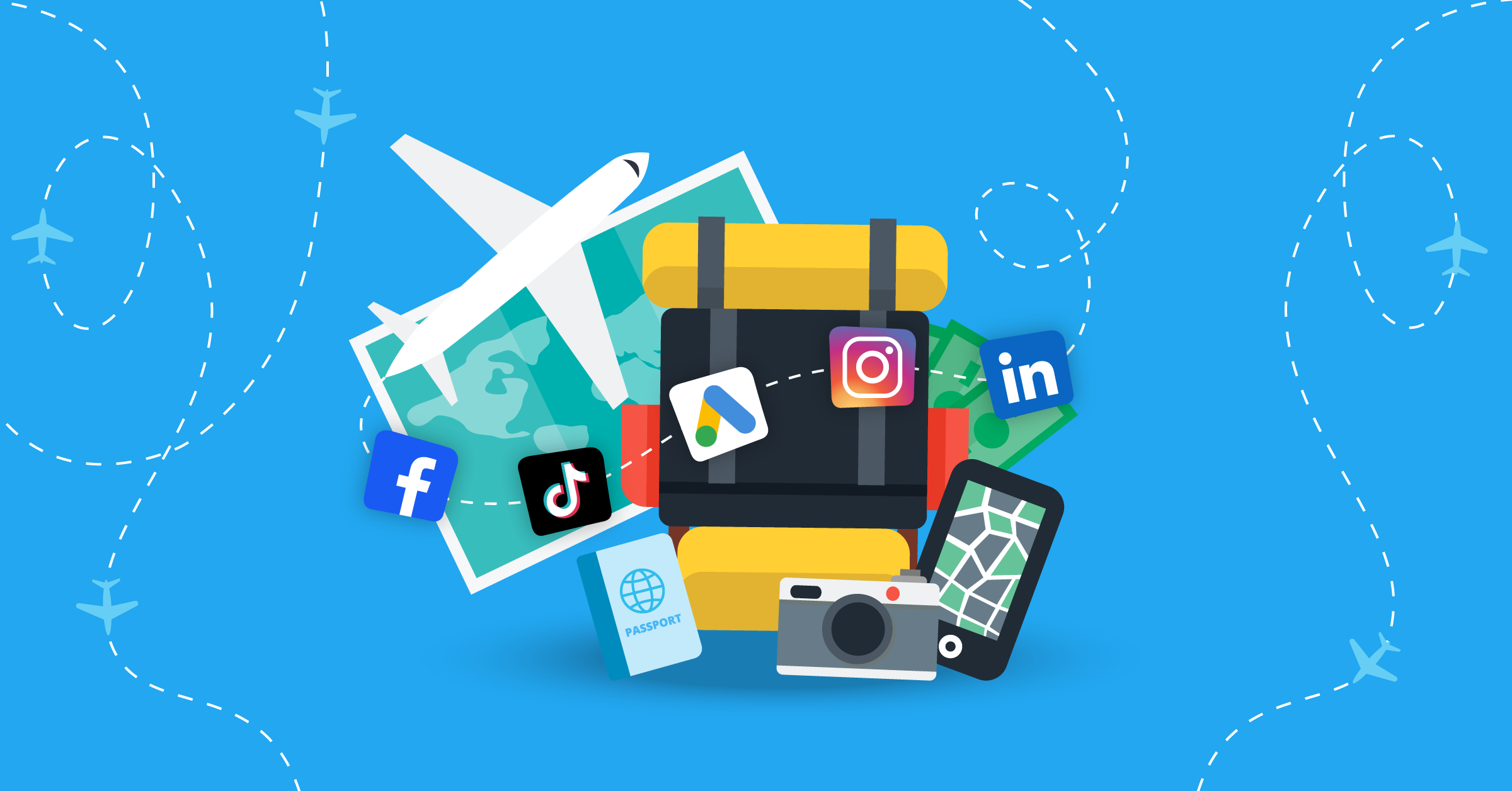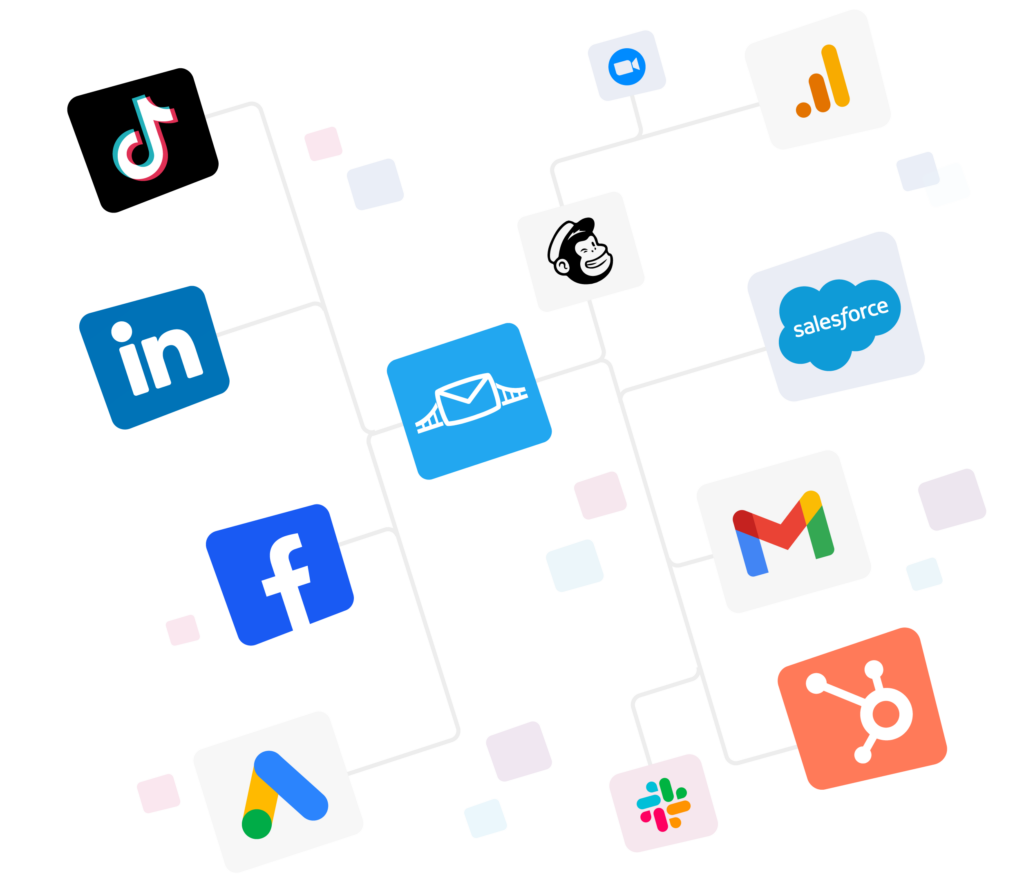
The travel industry has bounced back quicker than expected post-pandemic. In fact, international travel doubled in 2022 compared to 2021 and is back up to 63% of the total international travelers in 2019. As travelers return to their normal excursion frequency, travel marketers can return to their old ways, but must do so with an innovative mindset.
- What is travel marketing?
- Why invest in travel marketing?
- 8 powerful marketing tips for travel agents in 2023
- 1. Develop a mobile strategy
- 2. Personalized customer experiences via SMS
- 3. Virtual reality experiences
- 4. Retarget people who have shown interest
- 5. Implement Facebook Messenger bots
- 6. Partner with micro-influencers
- 7. Create an engaging and informative blog
- 8. You can’t spell “destination” without SEO
- How to promote a travel marketing strategy
- How marketing automation can implement the best travel marketing strategies
- Final thoughts
In this article, we’ll discuss travel marketing along with result-driving tips to strategize, achieve maximum exposure, and increase your revenue. Additionally, this article introduces tools for automating your travel business through all stages of lead acquisition, retargeting, and tracking, such as:
What is travel marketing?
The term travel marketing (or tourism marketing) is used to describe the marketing strategies used by brands in the travel industry, including hotels, resorts, destinations, and travel agencies. It’s essentially the act of running campaigns on a variety of different platforms to attract potential travelers and turn them into paying visitors or guests.
Travel marketers were forced to completely reimagine their approach during the height of the pandemic, but as every day passes, a growing feeling of normalcy returns to the industry. With a familiar feeling of growth returning to the industry, travel marketers must be prepared to capitalize on this resurgent opportunity.
Why invest in travel marketing?
While the pandemic was devastating to the travel industry, the generational growth opportunity emerging from the ashes of 2020 cannot be ignored. Currently, 10.4% of the world’s GDP comes from tourism and that number is only expected to rise in the coming years.
Monetary advantages aside, travel marketing allows brands to paint their own picture of a destination to attract visitors. When you think of Italy, you probably think of delicious food, historical monuments, and the amazing art scene. That is the product of travel marketing. Similarly, the Amsterdam Light Festival Cruise showcases the city’s enchanting canals illuminated by stunning light installations, creating a magical experience that draws visitors from around the world.
A proper investment can allow marketers to shape perceptions, entice tourists, and effectively augment economic growth.
8 powerful marketing tips for travel agents in 2023
These travel industry marketing strategies tap into changing consumer needs, allowing brands to ramp up their travel lead generation efforts now that the travel industry is rapidly growing again. Here’s how to generate leads for your travel business.
1. Develop a mobile strategy
With the accessibility and capability of travel apps such as Hotels.com and Airbnb, travel marketers must design and implement a specific strategy compatible with mobile devices. The mobile customer experience must match –if not exceed– the quality of the online travel marketing strategies.
This approach needs to be succinct in its branding in order to entice more consumers to utilize the mobile app. Apps allow marketers to create a personalized experience and direct one-on-one communication with push notifications and reminders based on app usage.
Additionally, you can join our waiting list to be the first to hear about our new features for TikTok Custom Audiences.
2. Personalized customer experiences via SMS
34% of people read their text messages within five minutes of receipt and SMS generates a 45% response rate. This is a powerful way to connect with consumers without having to compete for attention in their email inboxes or busy social feeds–and consumers welcome it too. 91% of people say they would opt-in to receive SMS messages from their favorite brands.
One of the best marketing tips for travel agents is to send proactive messages based on a customer’s position in the sales cycle, their travel interests, their current or past bookings, and their behavior on your site or app. For example, if someone has a booking at your hotel in Las Vegas, send them personalized discounts for activities in Vegas or a guide to eating in the city to keep them engaged and ensure your brand stays front of mind. LeadsBridge has a range of powerful SMS integrations that make it easy to connect and sync your leads with your chosen SMS marketing platform.
Rhodes Rides sends personalized text messages to its contacts to help them book relevant trips and speed up the sales process.
3. Virtual reality experiences
Virtual travel experiences boomed during the pandemic and became one of the most prominent travel industry marketing strategies. While people were stuck at home, they soothed their itchy feet by taking virtual tours of far-flung museums and taking digital “walks” through tropical jungles. Instead of abandoning this approach, repurpose it to move consumers off the fence and onto a flight.
Hotels and resorts can provide 360-degree tours of their locations, rooms, and amenities. Incorporating a QR code generator allows travelers to quickly access these immersive experiences via their mobile devices, making it easy for apprehensive or indecisive travelers to get a real-life look at your destination and see what they can expect in person.
The NH Hotel Group publishes detailed 360-degree videos of its hotels for travelers to check out before they book.
4. Retarget people who have shown interest
Travel is a big purchase, and people are unlikely to make a decision the first time they land on your site. Use Facebook remarketing to target consumers who have visited specific pages on your site or have shown an interest in a specific hotel room, date, or activity.
LeadsBridge has several integrations for retargeting on Facebook, including the powerful Facebook Custom Audiences, feature that lets you create groups of people to target on Facebook based on their defined interests or past browsing behavior. For automating your workflow, check out these Facebook Custom Audiences integrations through LeadsBridge:
And here are some of our popular integrations for Facebook Conversions API you can use to run winning Facebook campaigns:
Levon Travel Bureau targets people who have already shown an interest in traveling to Armenia.
5. Implement Facebook Messenger bots
Travelers who are actively in buy mode want in-the-moment support and as little friction as possible. If they come across an issue they can’t get answered straight away, there’s a good chance they’ll go elsewhere. This is where Facebook Messenger bots come into play. They essentially act as an automated sales associate who can answer queries, suggest relevant products, and tackle objections.
Using an AI chatbot in this way encourages travelers to take action via clicks through a self-service feature that lets customers get solutions to their problems exactly when they need them.
Expedia’s Facebook Messenger bot helps travelers find the perfect trip for them through an automated Q&A.
6. Partner with micro-influencers
According to research, 49% of consumers rely on influencer recommendations to make purchasing decisions, and influencer marketing campaigns generate on average $5.78 for every dollar spent. But influencer marketing often refers to partnering with social media accounts that have a huge following. However, as travelers now crave more authentic experiences, it’s worth joining forces with smaller, more niche accounts.
Micro-influencers make up a large chunk of the influencer community at 47.3%, and 77% of marketers say that this type of influencer tops their list of ideal partners. Cherry-pick smaller influencer accounts (between 5,000-20,000 followers) with an engaged following, like the Malliouhana hotel did here when it partnered with Passport to Friday:
In the context of travel, these influencers might be adventure enthusiasts, luxury travel connoisseurs, or budget travel experts, each with a unique perspective and a dedicated following. That’s why influencer identification (discovery, audience analysis, and fake followers check) has become an increasingly important part of marketing strategy.
Consider making use of CRM software that can help you streamline communication with your influencers. You can set up a review and approval process so that their promotional content stays on-brand.
7. Create an engaging and informative blog
An engaging blog can answer consumers’ questions before they are asked, further persuade consumers looking for more reasons to travel, and offer tips and suggestions when traveling abroad.
All travelers want to be knowledgeable about where they are going and a blog is a perfect place for marketers to inform. The best thing is creating a new blog has never been easier. You can use tools like Surfer SEO, to create SEO optimized content, summarize an article to create succinct summaries for social media, and more.
The keys to a good blog are:
- Understand your audience: Travelers are diverse so understanding a consumer’s persona (budget traveler, family, solo, couple) is vital to successful audience targeting.
- Master the usage of powerful calls to action (CTA’s): Simple and compelling CTA’s that address common needs are often the best course. A few travel marketing examples of CTA’s”
- Escape winter, the Caribbean awaits
- Families fly free in February
- Honeymoon Planning: Romantic and affordable
8. You can’t spell “destination” without SEO
An effective SEO strategy can tell you what consumers are searching for and allow you to market to their specific needs. If there is an increase in searches relating to budget-friendly and cheap vacations, your travel marketing strategy should reflect that with a campaign centered around saving money.
How to promote a travel marketing strategy
There are several different promotional strategies applicable to travel marketing and unfortunately, there is not a one size fits all option. Each promotional strategy needs careful consideration to maximize efficiency and effectiveness within the target audience.
Here are three of the most popular promotional strategies in travel marketing.
Promotional videos
Short entertaining videos dominate the internet and every travel marketing promotional strategy should feature videos of some kind. For instance, share videos from actual customers on vacation or explore the sites to show others the benefits of travel. Moreover, these promotional videos could create a sense of FOMO (fear of missing out), which is one of the strongest marketing tools in 2023. Also, make sure to share it on your IG business profile. Get some followers who can help you share this content to boost engagement leading to higher conversions.
Newsletters
Newsletters are one of the most sustainable promotional marketing tools used across every industry. Newsletters allow companies to maintain frequent contact with their customer base and continually market new and existing products. Prospective customers can be enticed to sign up for the newsletter if a benefit is offered such as the announcement of new discounts and deals.
A monthly newsletter combines the best parts of marketing (long form, short form, videos, testimonials, social media), packages it all together, and takes the current or prospective customer on a journey through the previous month and what to expect in the future months.
Online banners
A great way to gain exposure is to place ad banners on the websites most visited by your target audience. These subtle reminders can help increase repeat traffic and generate new traffic. Referencing your SEO strategy could be beneficial to understanding the sites your target audience frequents and allow you to market more efficiently.
How marketing automation can implement the best travel marketing strategies
Powerful tools and advanced marketing software make it easier than ever to capture customer data and use it to serve personalized experiences.
LeadsBridge integrations such as Facebook Custom Audiences, and Google Customer Match help travel brands laser-focus their efforts and reach people based on their unique interests and browsing behavior, while CRM integrations with platforms like Zoho CRM, Sugar CRM, and Freshsales help sync up data to use across advertising campaigns.
Use these integrations for free to add automation to your Facebook Lead Ads:
We recommend you try these popular integrations with Facebook Custom Audiences for creating automated campaigns. While not included in our freemium plan, these integrations allow you to grow faster and improve your overall Facebook advertising performance:
Final thoughts
Following these marketing tips for travel agents and implementing strategies will help travel brands grow their following, build trust, and drive sales. Automating your marketing efforts with LeadsBridge’s integrations will help small businesses save time while still reaching their marketing goals. Our freemium plan lets you move contacts across platforms to create slick marketing campaigns on multiple different channels.
Get started with LeadsBridge for free today to integrate your travel tools and automate your lead generation.




































